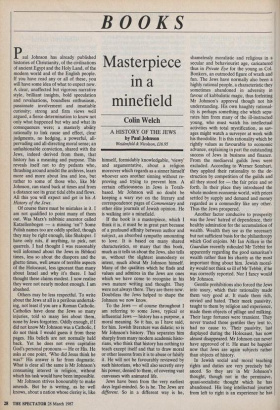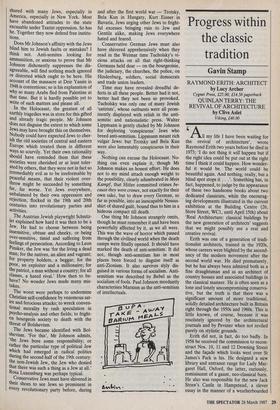BOOKS
Paul Johnson has already published histories of Christianity, of the civilisations of ancient Egypt and the Holy Land, of the modern world and of the English people. If you have read any or all of these, you will have some idea of what to expect now. A clear, unaffected but vigorous narrative style, brilliant insights, bold speculation and revaluations, boundless enthusiasm, passionate involvement and insatiable curiosity; strong and firm views well argued, a fierce determination to know not only what happened but why and what its consequences were; a masterly ability rationally to link cause and effect, clear judgments, no hedging, a powerful, all- pervading and all-directing moral sense; an unfashionable conviction, shared with the Jews, indeed derived from them, that history has a meaning and purpose. This reveals itself not to dry pedants who, thrashing around amidst the archives, learn more and more about less and less, but rather to some of those who, like Mr Johnson, can stand back at times and from a distance see its great tidal ebbs and flows. All this you will expect and get in his A History of the Jews.
Of course there must be mistakes in it. I am not qualified to point many of them out. Was Marx's rabbinic ancestor called Katzellenbogen — a missing 'en'? Some Polish names too are oddly spelled, though they may be right enough, like Shaksper. I have only nits, if anything, to pick, not quarrels. I had thought I was reasonably well informed about the Jews in Biblical times, less so about the diaspora and the ghetto times, well aware of terrible aspects of the Holocaust, less ignorant than many about Israel and why it's there. I had thought these claims modest. I now realise they were not nearly modest enough. I am abashed.
Others may be less respectful. To write about the Jews at all is a perilous undertak- ing, not least if you are a Roman Catholic. Catholics have done the Jews so many injuries, told so many lies about them, none by Jews forgotten. Oddly enough, if I did not know Mr Johnson was a Catholic, I do not think I would guess it from these pages. His beliefs are not normally held back. Yet he does not even capitalise God's personal pronouns — He or His. He asks at one point, 'Who did Jesus think he was?' His answer is far from dogmatic. What is clear all the same is Mr Johnson's consuming interest in religion, without which his task would have been impossible.
Mr Johnson strives honourably to make amends. But he is writing, as he well knows, about a nation whose clerisy is, like
Masterpiece in a minefield
Colin Welch
A HISTORY OF THE JEWS by Paul Johnson
Weidenfeld & Nicolson, £16.95
himself, formidably knowledgable, `viewy' and argumentative, about a religion moreover which regards as a sinner himself whoever sees another sinning without re- proving and trying to prevent him. A certain officiousness in Jews is Torah- based. Mr Johnson will no doubt be keeping a wary eye on the literary and correspondence pages of Commentary and other elite journals of Jewish opinion. He is walking into a minefield.
If the book is a masterpiece, which I think it is, it must be in great part because of a profound affinity between author and subject, an absorbed sympathy amounting to love. It is based on many shared characteristics, so many that this book, much as it tells us about the Jews, also tells us, without the slightest immodesty or intent, much about Mr Johnson himself. Many of the qualities which he finds and values and admires in the Jews are ones which we have come to recognise in his own mature writing and thought. They were not always there. They are there now. Doubtless the Jews helped to shape the Johnson we now know.
To the Jews — of course throughout I am referring to some Jews, typical or influential Jews — history has a purpose, a moral meaning. So it has, as I have said, for him. Jewish literature was didatic; so is Mr Johnson's history. This separates him sharply from many modern academic histo- rians, who think that history has nothing to teach except itself and that to draw moral or other lessons from it is to abuse or falsify it. He will not be favourably reviewed by such historians, who'will also secretly envy his power, denied to them, of covering vast canvasses with animated life.
Jews have been from the very earliest days legal-minded. So is he. The Jews are different. So in a different way is he, shamelessly moralistic and religious in a secular and behaviourist age, caricatured thus in Private Eye for the young as Col. Bonkers, an outmoded figure of wrath and fun. The Jews have normally also been a highly rational people, a characteristic they sometimes abandoned in adversity in favour of kabbalistic magic, thus forfeiting Mr Johnson's approval though not his understanding. His own haughty rational- ity is perhaps something else which sepa- rates him from many of the ill-instructed young, who must watch his intellectual activities with total mystification, as sav- ages might watch a surveyor at work with his theodolite. It is this rationality which he rightly values as favourable to economic advance, explaining in part the outstanding success of Jews in business and finance. From the mediaeval guilds Jews were excluded. According to Werner Sombart, they applied their rationality to the de- struction by competition of the guilds and all they stood for — the fair price and so forth. In their place they introduced the whole modern economic world, with prices settled by supply and demand and money regarded as a commodity like any other. Thus the Jews prospered.
Another factor conducive to prosperity was the Jews' hatred of dependence, their healthy admiration for the accumulation of wealth. Wealth they see as the necessary but not sufficient basis for the philanthropy which God enjoins. Mr Ian Aitken in the Guardian recently ridiculed Mr Tebbit for apparently regarding the good samaritan's wealth rather than his charity as the most important thing about him. Jewish moral- ity would not think so ill of Mr Tebbit, if he was correctly reported. Nor I fancy would Mr Johnson.
Gentile prohibitions also forced the Jews into usury, which their rationality made them very good at. It made them rich, envied and hated. Their meek passivity, taught to them by religion and experience, made them objects of pillage and milking. Their large fortunes were transient. They never trusted those gentiles they lent to, had no cause to. Their passivity, last displayed during the Holocaust, has now almost disappeared. Mr Johnson can never have approved of it. He must be happier now that Jews are again subjects rather than objects of history.
In Jewish social and moral teaching rights and duties are very precisely bal- anced. So they are in Mr Johnson's thought, though not in the permissive, quasi-socialistic thought which he has abandoned. His long intellectual journey from left to right is an experience he has shared with many Jews, especially in America, especially in New York. Most have abandoned attitudes to the state excusable under Tsarist oppression. So has he. Together they now defend free institu- tions.
Does Mr Johnson's affinity with the Jews blind him to Jewish faults or mistakes? I think not. Anti-semites looking for ammunition, or anxious to prove that Mr Johnson dishonestly suppresses the dis- agreeable, will find nothing much ignored or distorted which ought to be here. His account of the massacre at Deir Yassin in 1948 is contentious; so is his explanation of why so many Arabs fled from Palestine at that time. But it is hardly possible yet to write of such matters and please all. In the Holocaust, the greatest of all earthly tragedies was in store for this gifted and already tragic people. Mr Johnson does not disguise the extent to which some Jews may have brought this on themselves. Nobody could have expected Jews to cher- ish the old societies of central and eastern Europe which treated them in different ways so scurvily. Yet their own rationality Should have reminded them that these societies were cherished or at least toler- ated by others, that they were not in fact so irremediably evil as to be irreformable by Peaceful means, that their violent over- throw might be succeeded by something far, far worse. Yet Jews everywhere, unbalanced by their own oppression and rejection, flocked in the 19th and 20th centuries into revolutionary parties and activities.
The Austrian Jewish playwright Schnitz- ler explained how hard it was then to be a Jew. He had to choose between being insensitive, obtuse and cheeky, or being over-sensitive, timid and suffering from feelings of persecution. According to Leon Pinsker, the Jew was `for the living a dead man; for the natives, an alien and vagrant; for property holders, a beggar; for the Poor, an exploiter and a millionaire; for the patriot, a man without a country; for all classes, a hated rival.' How then to be- have? No wonder Jews made many mis- takes.
The worst were perhaps to undermine Christian self-confidence by venomous sat- ire and ferocious attacks; to wreck conven- tional morality by rash speculation in Psychoanalysis and other fields; to fright- en bourgeois society to death with the threat of Bolshevism.
The Jews became identified with Bol- shevism. Tor this', Mr Johnson admits, the Jews bore some responsibility; or rather the particular type of political Jew Which had emerged in radical politics during the second half of the 19th century: the non-Jewish Jew, the Jew who denied that there was such a thing as a Jew at all.' Rosa Luxemburg was perhaps typical. Conservative Jews must have shivered in their shoes to see Jews so prominent in every revolutionary party before, during and after the first world war — Trotsky, Bela Kun in Hungary, Kurt Eisner in Bavaria, Jews urging other Jews to fright- ful excesses bringing ruin to Jew and Gentile alike, making Jews everywhere hated and feared.
Conservative German Jews must also have shivered apprehensively when they read in the Weimar time Tucholsky's vi- cious attacks on all that right-thinking Germans held dear — on the bourgeoisie, the judiciary, the churches, the police, on Hindenburg, soldiers, social democrats and trade union leaders.
Time may have revealed dreadful de- fects in all these people. Better had it not, better had they not been so provoked. Tucholsky was only one of many Jewish `satirists', whose outbursts were all prom- inently displayed with relish in the anti- semitic and nationalistic press. Walter Lippmann is gently chided by Mr Johnson for deploring `conspicuous' Jews who breed anti-semitism. Lippmann meant rich vulgar Jews: but Trotsky and Bela Kun were also lamentably conspicuous in their way.
Nothing can excuse the Holocaust. No- thing can even explain it, though Mr Johnson makes an honest effort. He does not to my mind attach enough weight to the possibility, clearly adumbrated in Mein Kampf, that Hitler committed crimes be- cause they were crimes, not exactly for their own sake, but to draw every German, so far as possible, into an inescapable Nessus- shirt of shared guilt, bound thus to him in a hideous compact till death.
One thing Mr Johnson strangely omits, though he must remember it and have been powerfully affected by it, as we all were. This was the wave of horror which passed through the civilised world when the death camps were finally opened. It should have marked the death of anti-semitism. It did not, though anti-semitism has in most places been forced to disguise itself as anti-Zionism. It also survives slyly dis- guised in various forms of socialism. Anti- semitism was described by Bebel as the socialism of fools. Paul Johnson mordantly characterises Marxism as the anti-semitism of intellectuals.



















































 Previous page
Previous page